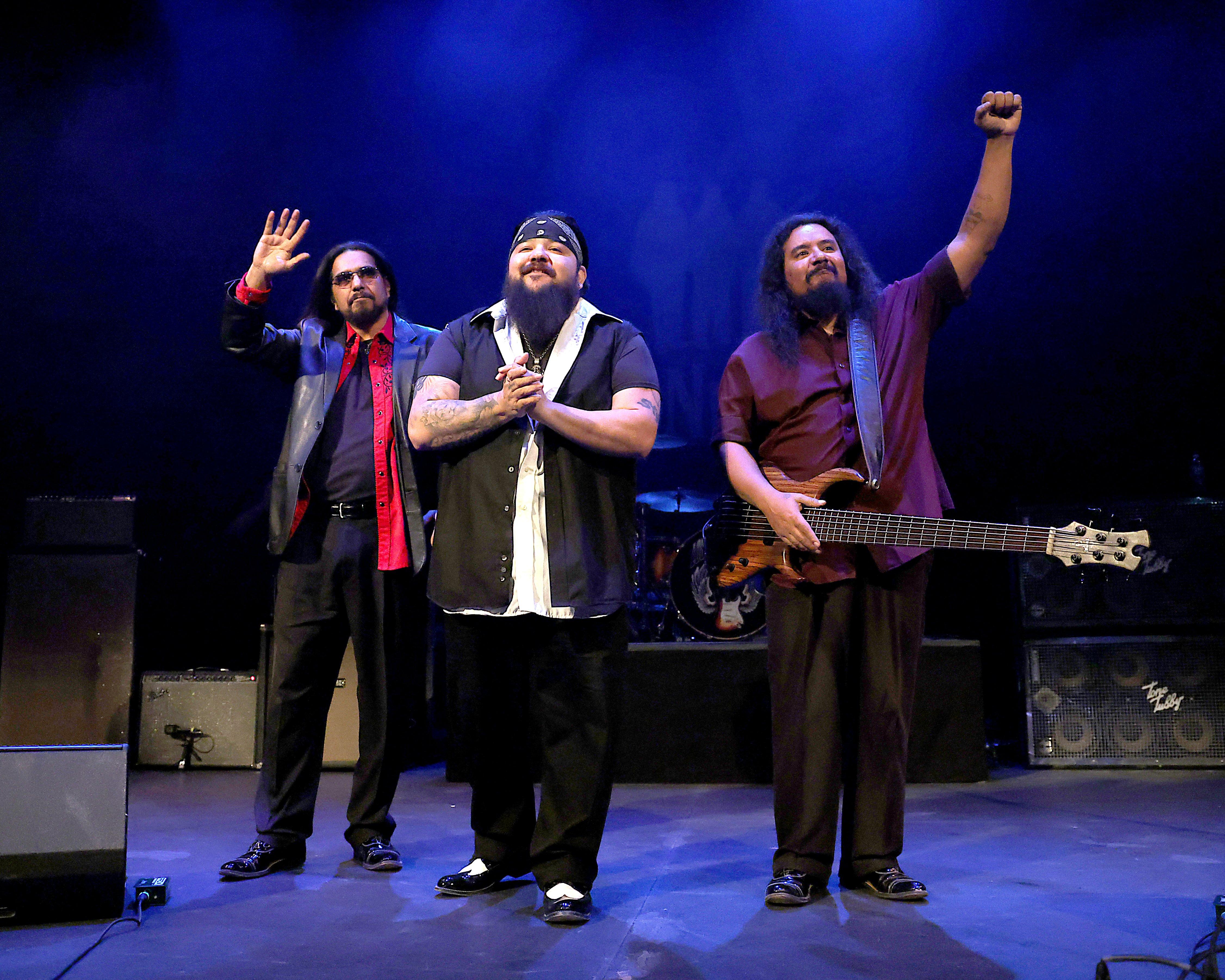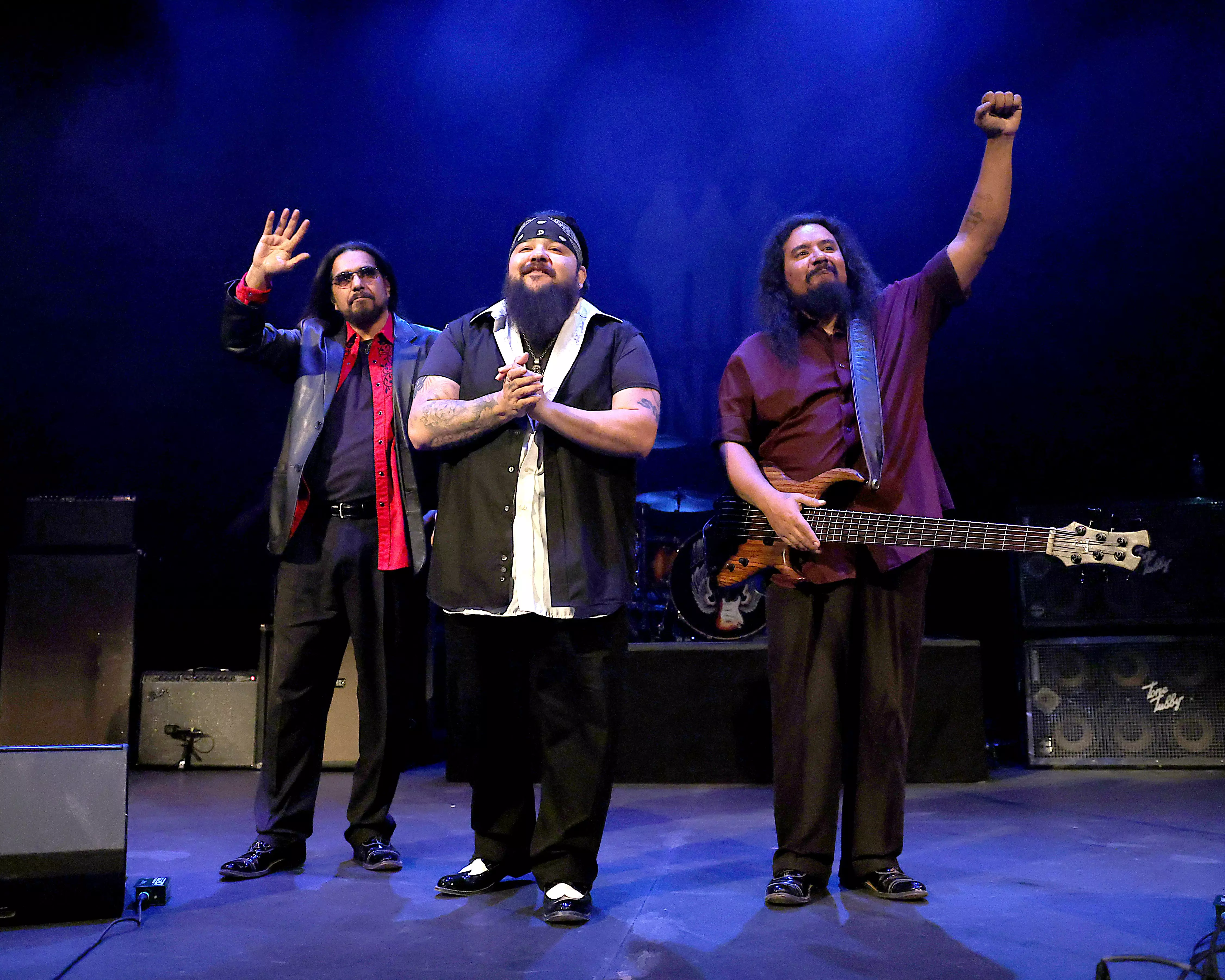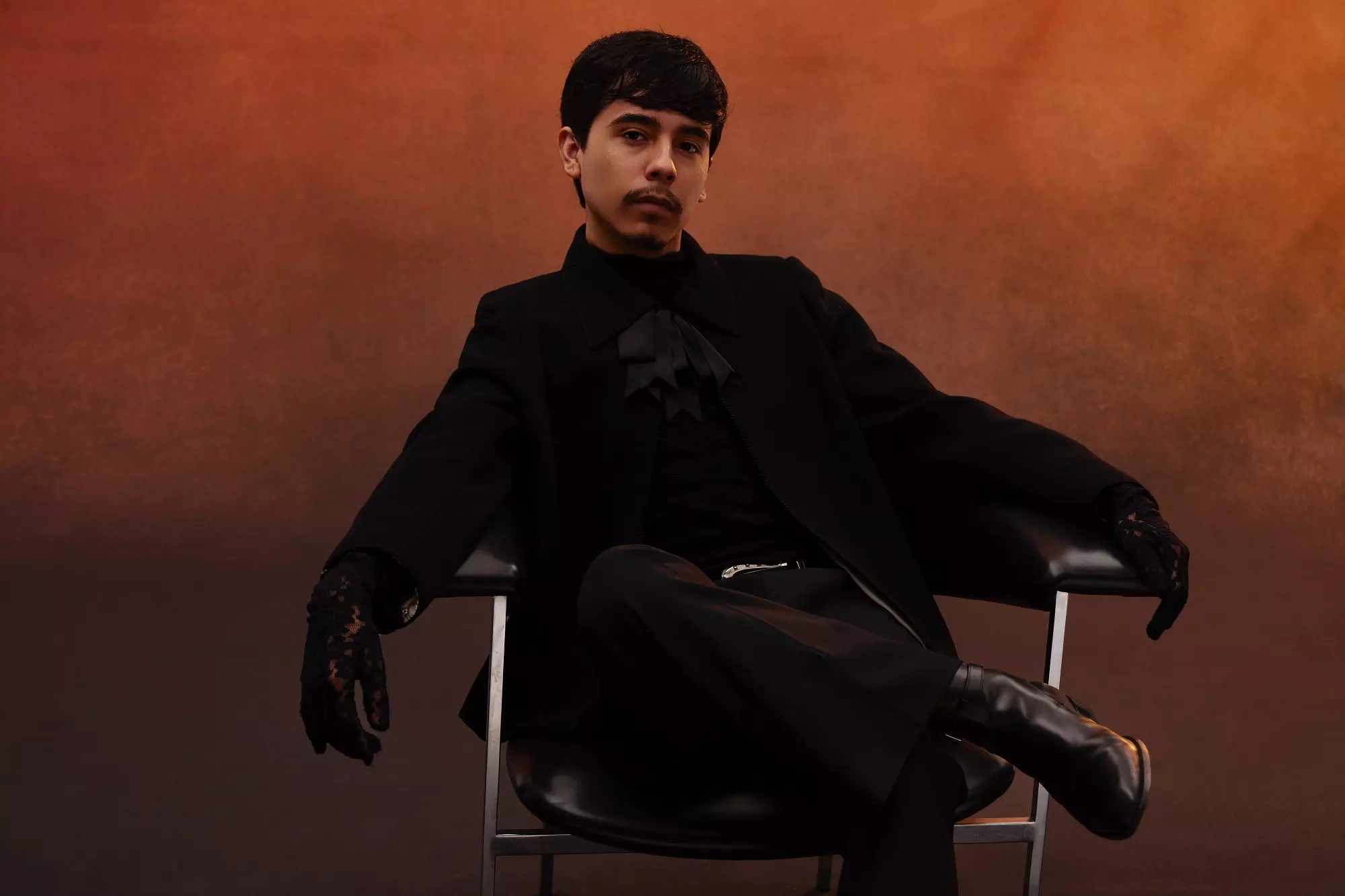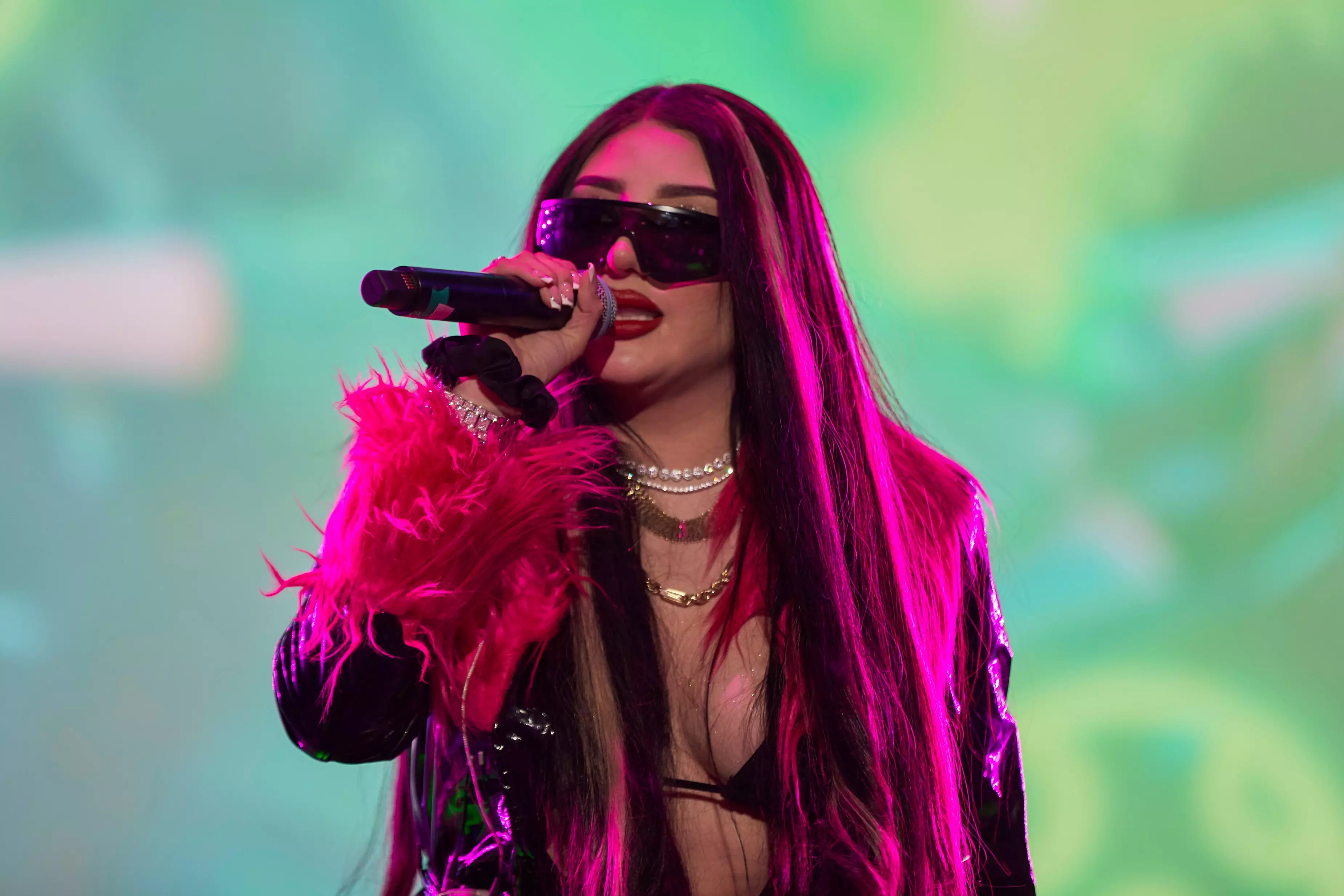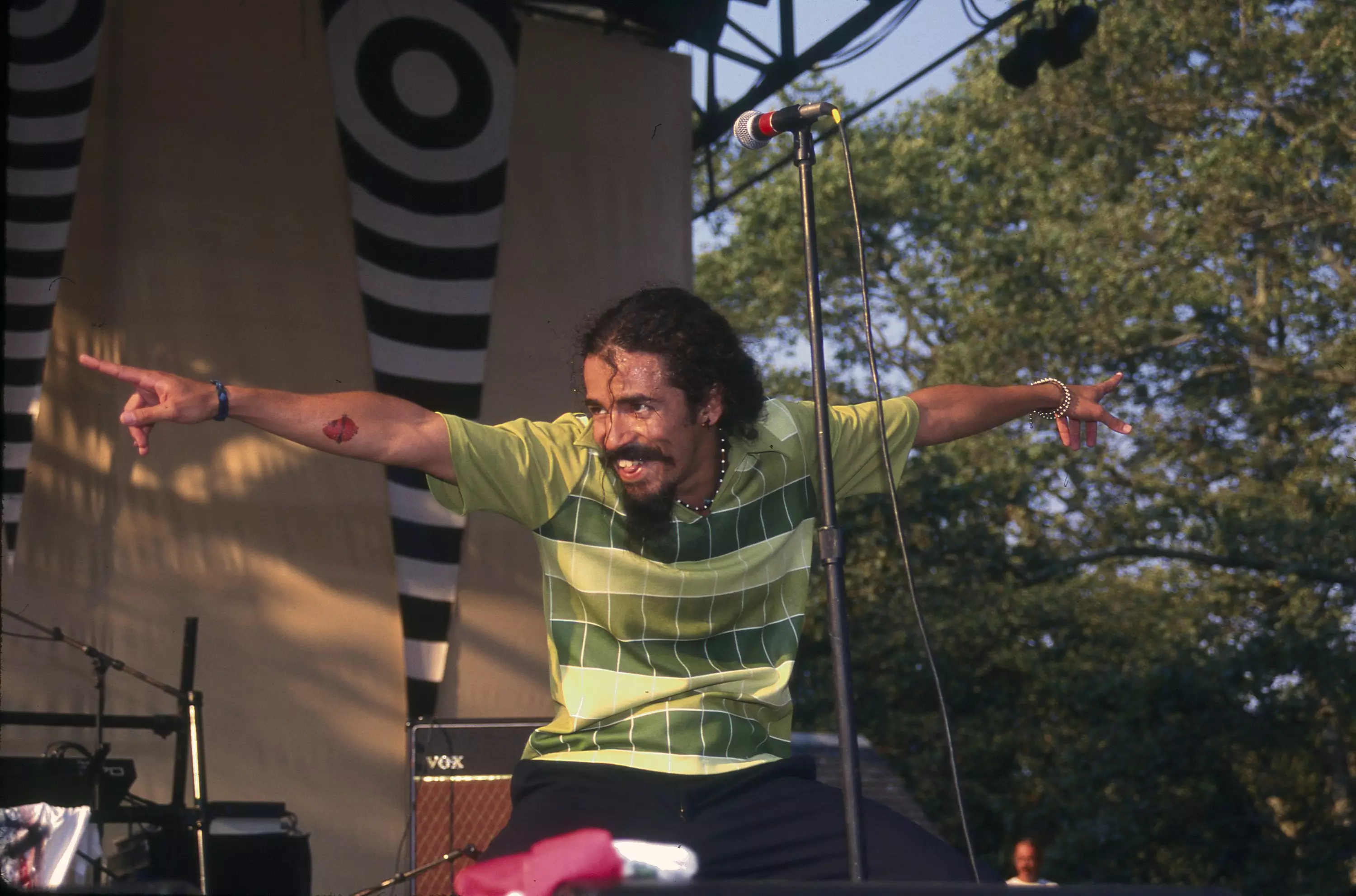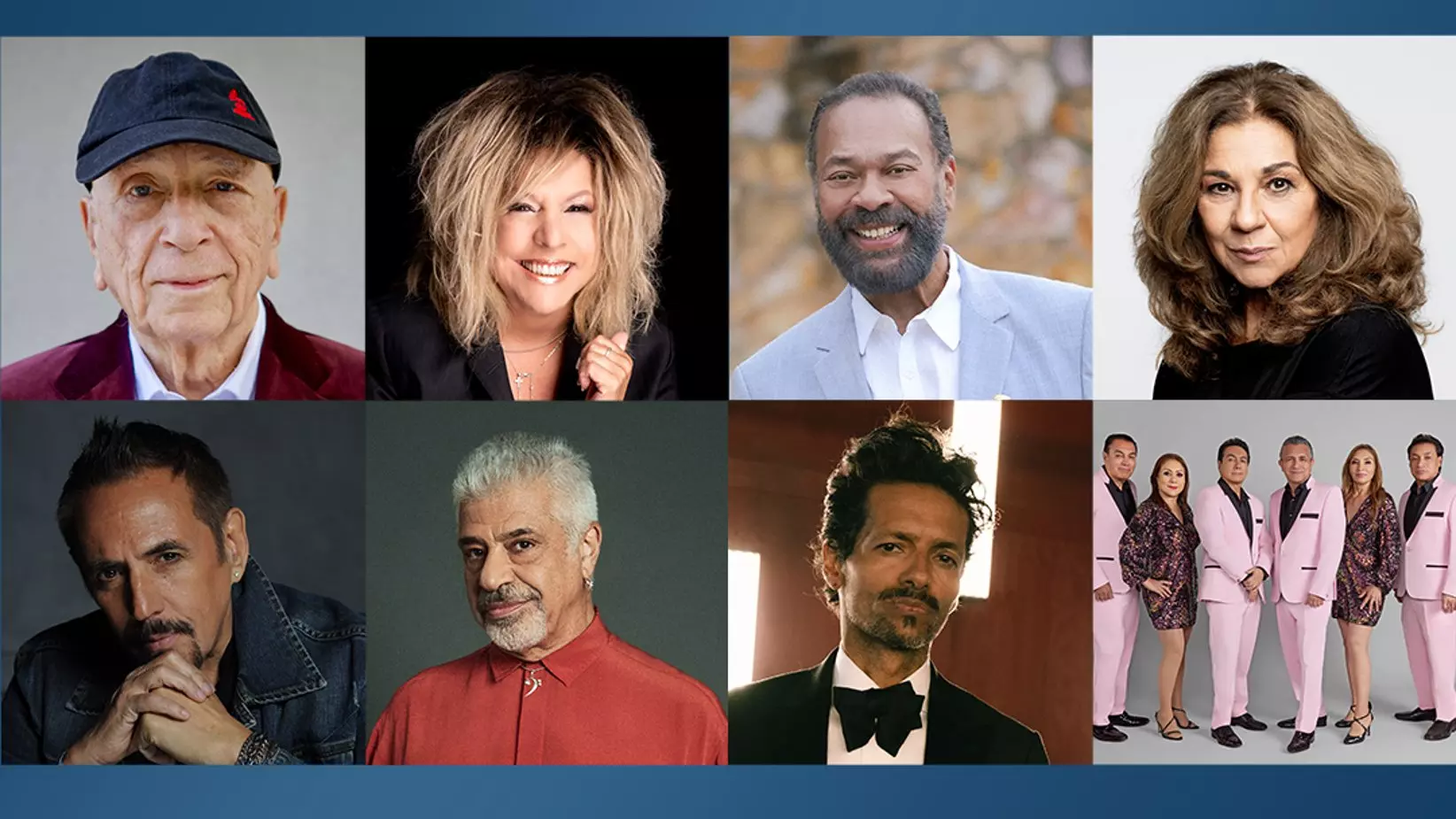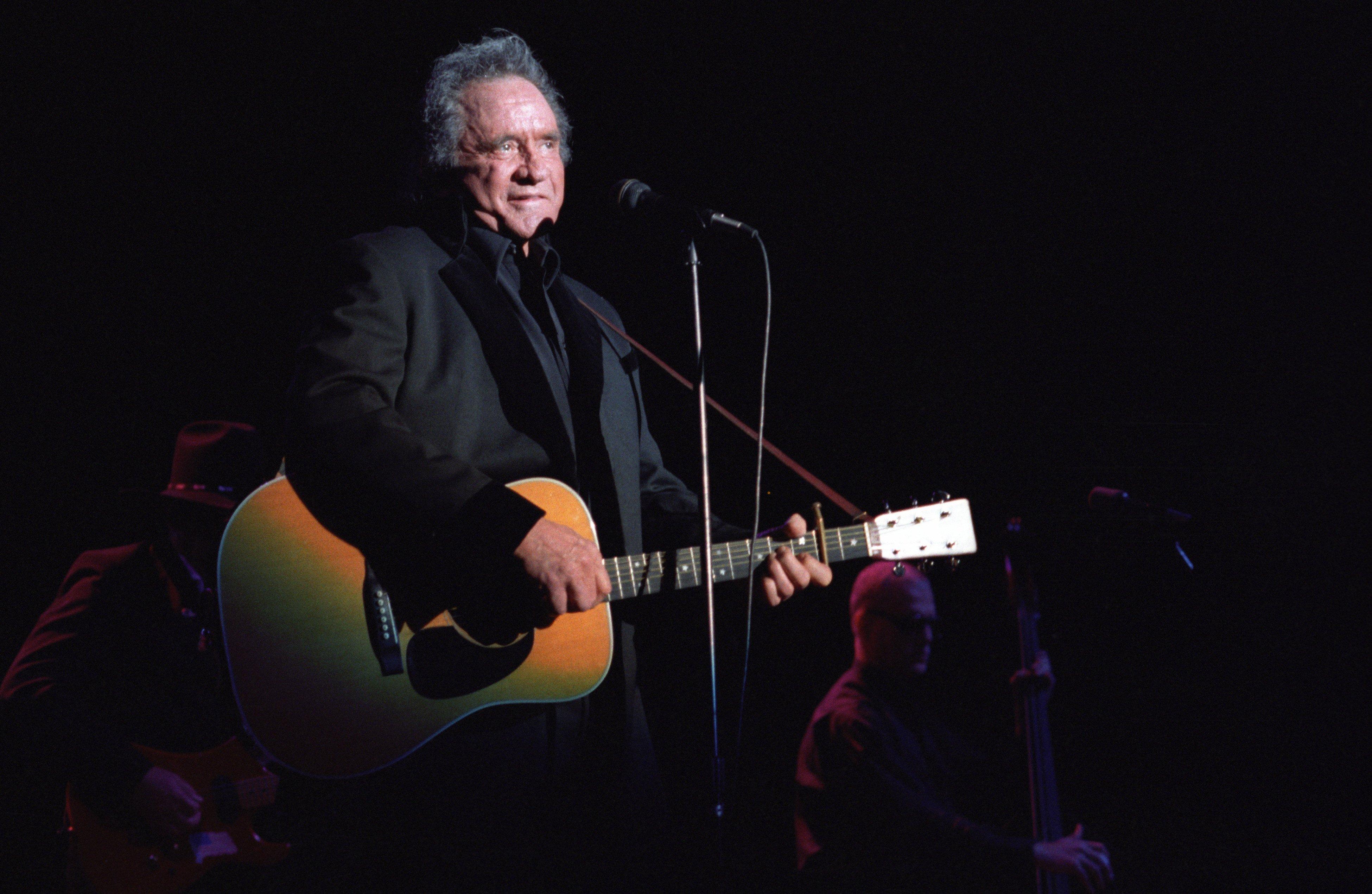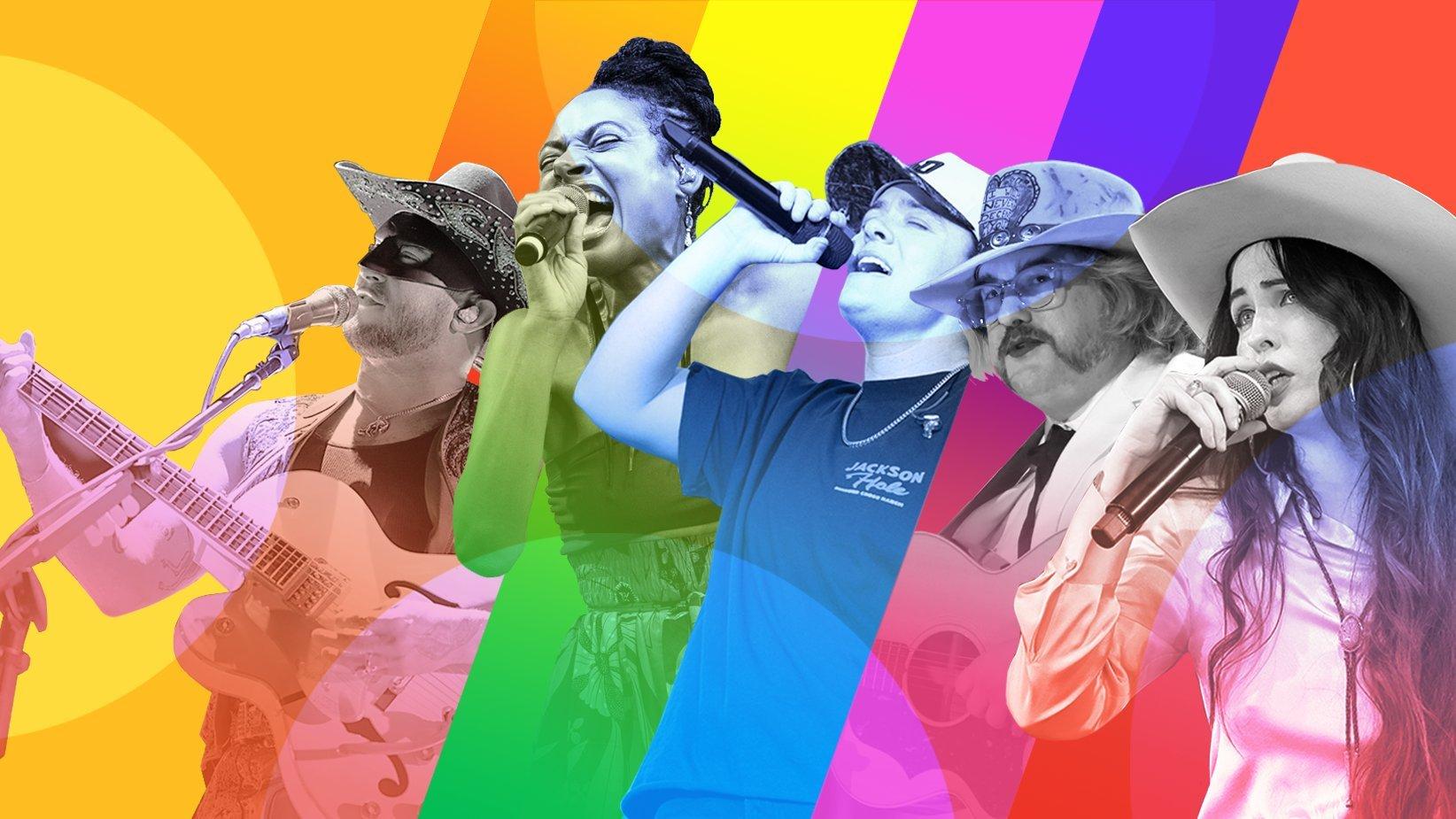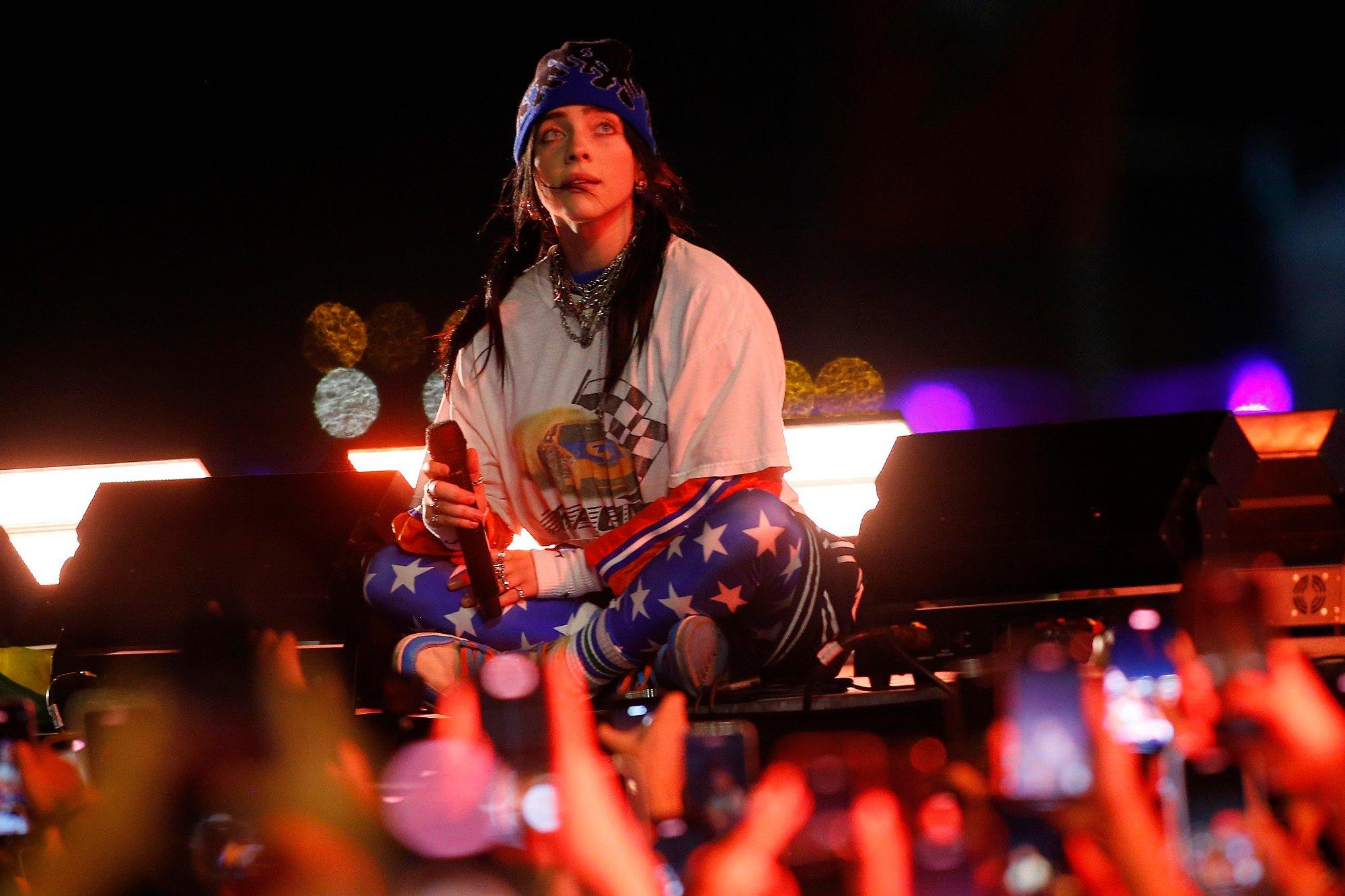Los Lonely Boys have found success in spades over the past two decades, thanks in no small part to their familial bonds.
Following in the footsteps of their musician father Enrique Garza, Mexican American brothers JoJo (vocals, bass), Henry (guitar, vocals) and Ringo Garza (drums, vocals) formed Los Lonely Boys in 1997. Their dynamic, "Texican Rock ‘n Roll" sound netted the group a GRAMMY in 2005, as well as five career total nominations. Throughout their career, togetherness has remained an important component of their artistry.
"We're homebodies, we're family men and this is where we're most happy," JoJo Garza tells GRAMMY.com. "But when we get out there and we're on stage and we're in a different city, different state or whatever, the way that people make us feel like family is, it's a home away from home feeling."
That feeling inspired the band to reunite in 2022 after a four-year hiatus. Their return tour, which included several shows with the Who, went so well that they decided to also get back into the studio and record new music. On Aug. 2, the band will release their first album of new music in 11 years, Resurrection. Each song on the album sounds different, highlighting Los Lonely Boys' roots in Texas blues, soul, country, and Tejano music.
"When we got back together and started jamming, I think the rejuvenation, it came natural, the same, and it just felt right, fresh," says Ringo Garza. "I think our playing is the same as anything that gets older. If it doesn't start to rot, it gets better."
The Garza brothers have built their success through belief in one another. It paid off early on, when San Angelo, Texas club owner John R. Steele hired the group as his house band (and later became LLB's road manager). They also supported their musician father before branching out as a trio. In 2003, they struck gold when they got the opportunity to record their self-titled debut album at Willie Nelson's Pedernales Recording Studio in Austin.
Released in 2004, Los Lonely Boys' lead single, "Heaven," hit No. 1 on the Billboard adult contemporary chart and reached the top 40 on the Billboard Hot 100. The following year, the song took home a golden gramophone for Best Pop Performance by a Duo or Group with Vocal.
Their success allowed them the chance to collaborate with the other musicians. Los Lonely Boys partnered with Santana on 2005's "I Don’t Wanna Lose Your Love," performed with Ronnie Milsap on an episode of "CMT's Crossroads," and released music with Dr. John, Enrique Garza Sr. and Willie Nelson. LLB also released a string of popular studio albums, including 2006’s Sacred, 2008’s Forgiven, 2011’s Rockpango, and 2013’s Revelation.
Recorded in part at Henry’s home studio in Texas, Resurrection finds the trio continuing to channel their love of making music together. Their unique sound continues on the album, featuring everything from the Beatles-eque pop of "Wish You Would" to the smooth R&B and soulfulness of "Dance With Me."
Family continues to be important for the brothers. The album comes at a challenging period as they’ve tried to help and make their father comfortable after he suffered a stroke and heart attack earlier this summer. Ahead of the Resurrection's release, the group spoke with GRAMMY.com about the importance of their brotherly bond and how music has a magical quality that lets them connect with others.
This interview has been edited for clarity and brevity.
The new album is the band’s first in 11 years and comes on the heels of a recent return to the road. What brought everyone back together?
Henry Garza: We got to give all that credit to the man upstairs, brother. Of course, we could take some little bit of credit for that being brothers and family, but we accredit the higher power man. It's just the way things happen. It's like why are the stars in the places they are and why did that one shine brighter tonight than the last?
JoJo Garza: We need to pay our bills, man. I'm kidding. I mean, it is our livelihood, but it ultimately comes down to realizing that we still have a major purpose. While we have life in our bones, we still have a purpose to express what the creator has given us as a blessing, but also to express purpose in needing to show how important music is and what it means to us to do with it.
Henry: Yeah, we’ve got to still keep spreading that message of love through music.
What made the band start thinking about creating new music?
JoJo: We never stopped creating music. Even when we took our much-needed sabbatical, we were still in the process of always writing music. And I think when Covid happened, that really put a halt on what musicians could do as far as touring goes. So, we were able to really sort of almost start over. The songs that we chose for the album were given an ample amount of time to be something we felt really positive about.
Some of [those songs] are about having a good time and a lot of them are about life's lessons, but there's a few tunes in there too that are really, really deep as far as offering some input to the people, to the youth, as well as people in our age bracket as well.
JoJo: We were also personally affected by losing some family members and things like that, just like everyone across the world. Whenever we finally did regroup and saw each other for the first time, one of the first things we did was we gave each other big hugs and big kisses and a lot of crying.
I know that Henry and Ringo had done some work together. One of the first things I told Henry when I had heard "Send More Love" was the last time he had delivered a song like this it went global, we went worldwide. We won a GRAMMY.
It's got the basis of what was going on through Covid and it's kind of like a letter to or a phone call to the man upstairs saying, "Hey, could you send more love down here because this world is going crazy."
Was it challenging starting to play again after a few years apart?
Henry: Oh man. It was hard to remember any of the songs that we had played. It was a really emotional gettogether. When we first started rehearsing again together, every song that we played, even old songs, tears were falling because you just didn't know during that time if and when that was ever going to happen again.
Were there things the band was able to do better or differently on 'Resurrection' with everyone older and wiser?
JoJo: I think as far as the music goes, it’s very apparent that we have matured and grown. We actually embraced a little bit more of the digital aspect of what you can do in a studio.
Henry: There was growth during that period with technology for us and getting into the actual recording part of it ourselves and creating a studio to do the work in. We never had that gift or the comfortableness to be able to do that. We were always recording in somebody else's studio where you're paying a thousand dollars for every second that counts. So, we had some kind of freedom to be able to do that on our own and we grew in that aspect.
JoJo: We were always a live band, [that recorded live to tape]. The magic happens when you're live because then you can't go back and recut it or you can't go back and overdub it. Even when you record a live show, there's just a spark between each of us, a connection that it's really hard to capture. But building our own little studios and having the ability to do it ourselves, it's actually brought us closer and to the idea of maybe we should do a little more of this or a lot more of this instead of having to tour so much. So, that's in the cards for Los Lonely Boys as well. Squad goals.
My brothers gave me the opportunity to sit in the producer's seat on most of these songs. I was actually mixing some of the record while driving from Texas to California, listening in the car speakers. I was able to tell him, "Oh no, this has too much bass. We need to move that to the left or the right. Let's swap places." The ability to do that. Mix a record while you're driving. Come on man.
The band’s sound has been called "Texican Rock n' Roll" due to the diverse influences and that continues with this new album. Why is it important to have that dynamic, diversified sound?
Henry: We created what we call Texican rock and roll, which is anything and everything that has to do with real music from real musicians. This record really still expresses that about what we're about: family, love, brothers, the message of truth through music and resurrection. There's a little bit of flavor of everything in these songs, so it's kind of hard to just classify it as a certain genre.
Ringo Garza: Every single one of our albums has always had a song that you could put in another genre of music, country or pop or rock.
JoJo: It really is because we don't see or feel the boundaries between music. What we promote is not exclusivity, but inclusiveness because we're all one people…We're the human race and music is food for the soul.
Henry: Our dad taught us that music was the universal language, it didn't matter where you were from even if you didn't understand what they were saying. It speaks to everybody all across the board. I think that's our main focus with music.
Ringo: When I'm recording drum tracks or vocal tracks, I want my brothers to be impressed more than anything in the world. My brothers and my family. When we can get a song together and it brings a tear to our eyes and makes us love each other even more, that's what I strive for.I think my brothers are the same in that aspect of trying to impress and please one another.
You've all followed in the footsteps of your father, who himself had a band with his brothers called the Falcones. Why is that brotherly bond and honoring tradition so important?
Henry: If you can imagine a cup being filled with water and it spills over and there's another cup that takes on that water too. Our dad did it with his brothers, our mom's family did it with their brothers and my grandpa. Music was so natural, we thought everybody did it growing up. We owe all that to our greatest teacher, which of course for us is our dad. It began with him, and he’s our biggest hero.
He's the guy that showed us anything from the Beatles to Willie [Nelson] and Waylon [Jennings] to Richie Valens to Fats Domino. Every song he showed us growing up, we thought he wrote all those songs that he was showing us, and we believed he came on the radio, and we'd be like, "They're playing your song." He didn't deny it either.
Ringo: Having each other to play in this band together, it was just as natural as being brothers. I think when we were younger, we knew that we were brothers and we were a band, but I don't think that really dawned on us until we started playing out everywhere and knowing that there's not too many bands of brothers. I think that's where our strength comes from.
JoJo: We're family first. Even if we were doctors or we were lawyers or roofers, we were always going to stick together because that's the way we were raised. That's part of our destiny and that's part of what we're here to express. As beautiful it is as it is to have friends and extended family or whatnot. There's nothing like having true family, true blood.
This year marks the 20th anniversary of Los Lonely Boys' debut album and one of your biggest hits "Heaven." What do you recall about recording that record?
Henry: The way we grew up, we had zero expectations for anything because it just wasn't in the cards for where we came from. We were completely shocked and completely amazed when we were grabbing success.
Ringo: When we were younger playing and writing and recording, we knew that if we continued something was going to happen. But I don't think that we ever thought to ourselves, Hey, let's put this on the album so we can win a GRAMMY or so that we can sell millions of records.
JoJo: We have a very close connection to all the songs [on our debut album], but when it came to "Heaven," that was the only song that it seemed like everybody would pick on. All the people that were the Lonely team [were] basically saying that they didn't see nothing special in that song. The special thing to us was that it was a prayer that Henry had written that he was instructed to write down as a song. So, what a turn of events for everyone that said "nay" to have it turned up being the song.
Ringo: The first single was supposed to be "Real Emotions," and when we sent out [our music to radio stations in Austin], DJ Jody Denberg played "Heaven" instead. It lit the fire. It stayed up there [on the charts] for a little bit, and it broke. We're still able to reap the benefits of that.
What was your favorite memory of working at Willie's studio?
Henry: We can't talk about that man. Oh man. [Laughs.]
JoJo: The fact that we were there in a place that belonged to Willie Nelson. We had seen him on TV and heard him on the radio or whatever, you don't imagine that you're going to be that close to people. Basically, that was his home away from home. And so that's pretty freaking huge, man.
Henry: I'll never forget him driving up in his pickup and visiting us while we were outside drinking a couple of herbal refreshments. He treated us just like family. There's a lot of things to remember, but I think the fact that Willie was even around or took the time to make that connection with us.
JoJo: We were able to start meeting other artists and things like that, but he was the first one that said "these guys got something special. You might want to check him out."
Henry: Right around that time when we were recording the record, 9/11 had happened. "Heaven" was the only song that was recorded that day, on the day that the Twin Towers were hit and everything, man.
You later recorded a song with Willie and your dad called "Outlaws." What was your favorite memory from working on that song?
Henry: Our dad always considered himself the missing outlaw. So just to be working with Willie and having our dad work with him and be on the same song, man, that was the treat in itself. TWhen we hear that song, it's like tears to the eye because we were given the blessing to help our dad's dream come true a little bit.
Ringo: And it's a rocking song. It's pretty badass.
The album’s title 'Resurrection' continues the trend of using religious terminology. What drew you to that word?
JoJo: You can definitely tie it to religion, but resurrection exists without religion. When you look at how grass dies every winter and comes back to life and how trees, leaves fall through the fall and the winter and then they return. And resurrection is also like music. It's a gift that most people don't recognize as a gift or as something considered resurrection.
The reason we chose the term resurrection is because we were off the road for nearly three years and we weren't even sure we were going to play again. When we finally made that decision to come back I felt like…I mentioned the trees, the grass, how the sun rises and sets every day. It's a constant resurrection.We were given a chance to breathe new life into something.
Ringo: I love the fact that it does bring people closer to our father, closer to the love of this world in just that name.
Henry: When you got a band like us who won a GRAMMY for a song called "Heaven," and I think that speaks all in itself. So, when you hear a name title for a record called Resurrection, it ties into what we believe and how we were brought up, but it's definitely not something that we were going to go off and say that "Hey, this is religious."
What songs from the album surprised you most and how they came together?
Henry: Oh man, all of them. Songs seem to come out of thin air sometimes. Even when you try to write a song, it doesn't [always] happen. So, all of them are really just a surprise.
JoJo: Our song "Natural Thing" is really special because something we had already had [written years ago]. The way Ringo delivered it, I can't wait for the rest of the world to be able to hear this song. Ringo usually sings one song per album or something like that, but this one is very dear to us, but it's also very dear to Ringo because he sang it to his wife at their wedding.
Henry: It's a resurrected song.
JoJo: It really is. That's the true resurrection on the album.
The band's song "Wish You Would" has a pretty encouraging message about going for your dreams, while being careful. And conscient. Has becoming parents and grandparents shifted your perspective?
JoJo: We've been parents for a long time. Some of our oldest kids are in their twenties...There’s the old saying of "be careful what you wish for." If you're not careful about what you call dreams and aspirations, it can come with some serious consequences.
Another song on the album, "See Your Face" is a very emotional one as it pays tribute to your mother who passed away in 2015 as well as other family and friends. How was it helpful writing that song?
Henry: It's about our mother and how memories are in your head when you haven't seen someone for so long. You don't want to forget their face, but it's crazy how a memory pops up and you wish you could just hold it and control it.
Henry: Our dad had a massive stroke and a heart attack at the same time. And it's been a really tough time right now.
Ringo: It’s crazy how that song came out and the video and everything having to do with our mama and our dad is having a pretty rough time. Nothing is coincidental. Everything is meant to be, there's no such thing as coincidence.
JoJo: "Wish You Would" and "See Your Face" are kind of intertwined. That's one thing we're here to really express to people, is tell the people you love them or you're going to wish you would because someday you're going to be wishing just to see their face.
JoJo: Do it while you have the time, express to the people that mean the most to you, that they mean that to you.
Ringo: I think it ties into even "Send More Love" because I think a lot of that is being forgotten.
Henry: Love is growing cold in this world, man.
JoJo: We do music purely because first off, it's a given to us. Secondly, we do it purely for the music and each song that is given to us sort of appears out of thin air. It's definitely given from the creator of all things. There's nothing greater than being able to have the consciousness that we're given as human beings to be able to express these things so deeply.
The Latest News About Latin Music

